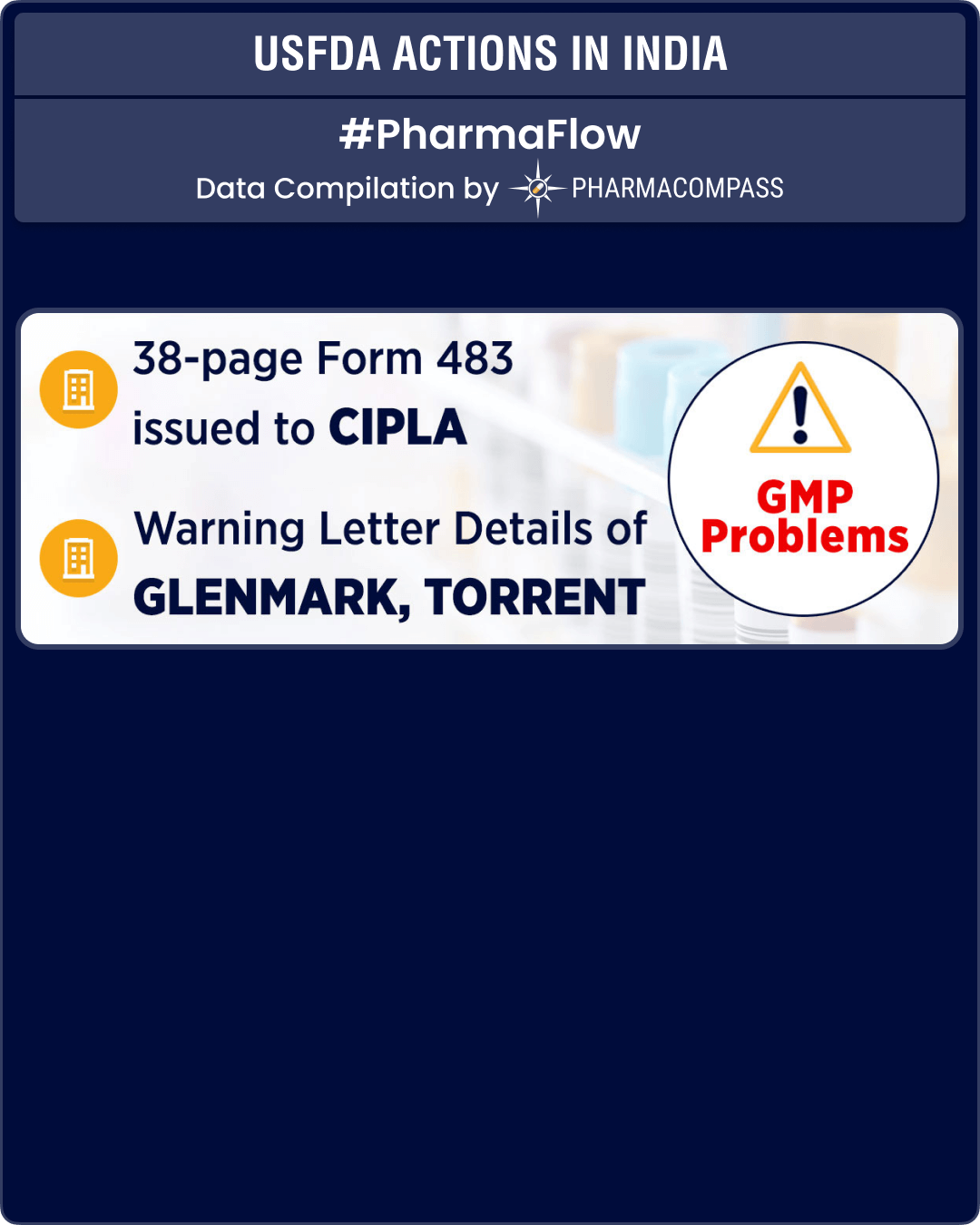
By PharmaCompass
2019-10-17
Impressions: 4545
Indian drugmakers struggles with the US Food and Drug Administration (FDA) continue as every week there is news on regulatory action by the agency. Over the last fortnight, we have reported on the warning letter issued to Lupin’s Mandideep Facility, data integrity concerns at Aurobindo Pharma and on the warning letters issued to Glenmark and Torrent. This week, there is news that another Indian drugmaker — Cipla — received a 38-page Form 483 for its drug manufacturing facility in Goa. We also bring you details on the warning letters issued to Glenmark and Torrent.
Cipla facility in Goa cited for cross-contamination concerns
The FDA inspected Cipla’s finished pharmaceutical manufacturing facility in Goa (India) last month.
The 11-day inspection had the FDA uncover inadequate cleaning practices as during a facility walkthrough there were multiple instances where layers of colored drug product residue was observed on the inside surfaces of air outlet ducts.
The 38-page Form 483 issued by the American agency to the facility states that these inlet and exhaust air ducts are an integral part of the drug manufacturing system and the Director of Technical Services confirmed that these ducts are not cleaned as part of the routine equipment cleaning operation.
The cross-contamination concerns were not limited to the discovery of colored drug product residue. In another observation, the aseptic filling areas were not operating as per the established classification and were found to be deficient regarding systems for maintaining equipment used to control the aseptic conditions.
The FDA inspectors also found the buildings used to manufacture and pack the drug products did not have the suitable size and construction to facilitate cleaning, maintenance and proper operations. The firm also failed to follow procedures, which had been designed to prevent microbiological contamination of drug products.
The observations have significance since Cipla’s Goa unit generates 25 to 30 percent of its US business.
FDA’s inspection at Torrent raises concerns over alternate losartan supplier approval
Six months after the FDA inspected Torrent Pharmaceuticals’ finished dosage form and active ingredient facility in India, the firm received a warning letter last week.
The eight-day inspection had raised concerns over the firm’s approach towards investigations and process validations.
As Torrent has been besieged with drug recalls in the United States for its ‘sartan’ products that have been found to contain cancerous nitrosamine impurities, which were found to be above the acceptable daily intake limits released by the FDA, the warning letter highlighted in more detail the FDA’s specific concerns.
Torrent had initiated a process validation (PV) using a new alternate API to manufacture Losartan Potassium tablets. As PV studies evaluate the soundness of design and state of control of a process throughout its lifecycle, Torrent’s protocol required that quality attributes should be met for “three consecutive” batches to qualify an alternate API. After the first batch failed to meet the quality criteria, Torrent added a fourth batch to the study which also failed to meet the necessary specifications. Multiple out-of-specification (OOS) investigations were initiated and quality rejected all four PV batches.
However, a new interim protocol was developed to justify commercial use of the alternate API, which circumvented the original protocol. Numerous Losartan Potassium Tablets USP 50 mg and USP 100 mg commercial batches were manufactured with this new alternate API and released to the US market despite the PV failures. In addition, multiple batches of Losartan Potassium were recalled for unacceptable amounts of nitrosamine impurities.
The FDA also raised concern as over the past three years Torrent’s investigations into OOS results for finished products had concluded that almost 73 percent of them were invalid. The FDA investigation mentioned almost a dozen examples where the original failing results were invalidated without a scientifically-sound and justifiable root cause.
The warning letter states that the concerns are a repeat observation from FDA’s April 17–28, 2017 inspection of Torrent’s Indrad facility (in Gujarat) and the FDA also cited a similar cGMP observation for inadequate investigations at Torrent Pharmaceuticals’ Dahej facility during a March 11–19, 2019, inspection.
FDA’s warning letter to Glenmark highlights unresolved issues with formulation since 2010
Since 2010, Glenmark’s topical cream formulations, manufactured at its facility in Baddi (Solan district in Himachal Pradesh) in India have been battling product grittiness issues. Since November 2017, the firm rejected 20 batches and received at least 38 complaints about product grittiness.
The FDA issued a warning letter to the firm after its April 2019 inspection and the warning letter highlights that product grittiness has been an ongoing formulation issue and was a deficiency cited in the previous inspection of the facility.
Following the inspection, Glenmark recalled 31,000 tubes of an anti-fungal product from the US market due to “temperature abuse” and complaints received due to the liquid texture of the product.
The warning letter highlights that temperature excursions during transit to the United States has been a problem for the creams sent from the facility and inadequate investigation into temperature excursions is an ongoing issue. Once again this was a deficiency cited during the previous inspection of the facility.
Glenmark’s filing with the stock exchange stated that it does not believe the warning letter will interrupt manufacturing or sales from the facility, which contributes US$ 30 million in total sales for the company. This makes up for about 7 percent of its US sales.
The news comes a few months after manufacturing concerns derailed Glenmark’s plans to get an approval for the New Drug Application of Ryaltris, as the FDA cited deficiencies in the Drug Master File pertaining to one of the APIs used in the product. The agency also cited deficiencies at its manufacturing facilities.
The PharmaCompass Newsletter – Sign Up, Stay Ahead
Feedback, help us to improve. Click here
Image Credit : USFDA Actions in India by PharmaCompass is licensed under CC BY 2.0
“ The article is based on the information available in public and which the author believes to be true. The author is not disseminating any information, which the author believes or knows, is confidential or in conflict with the privacy of any person. The views expressed or information supplied through this article is mere opinion and observation of the author. The author does not intend to defame, insult or, cause loss or damage to anyone, in any manner, through this article.”






